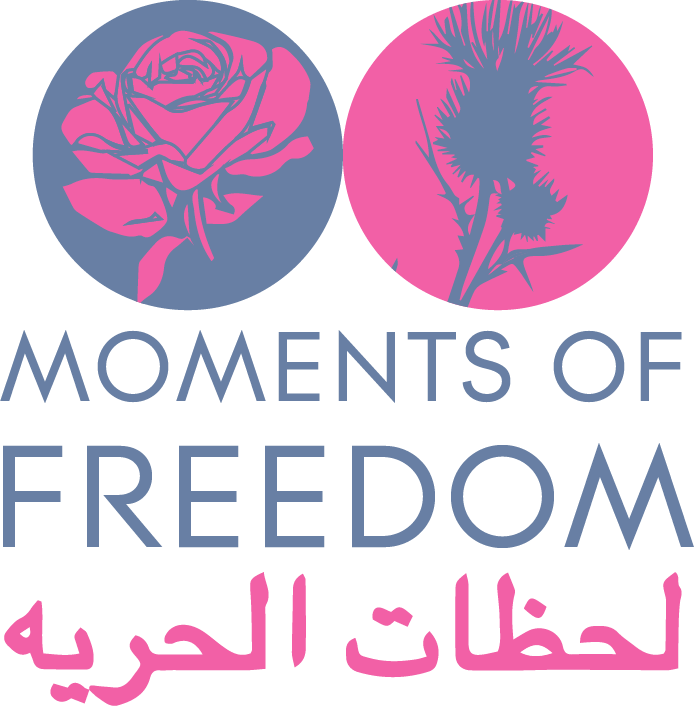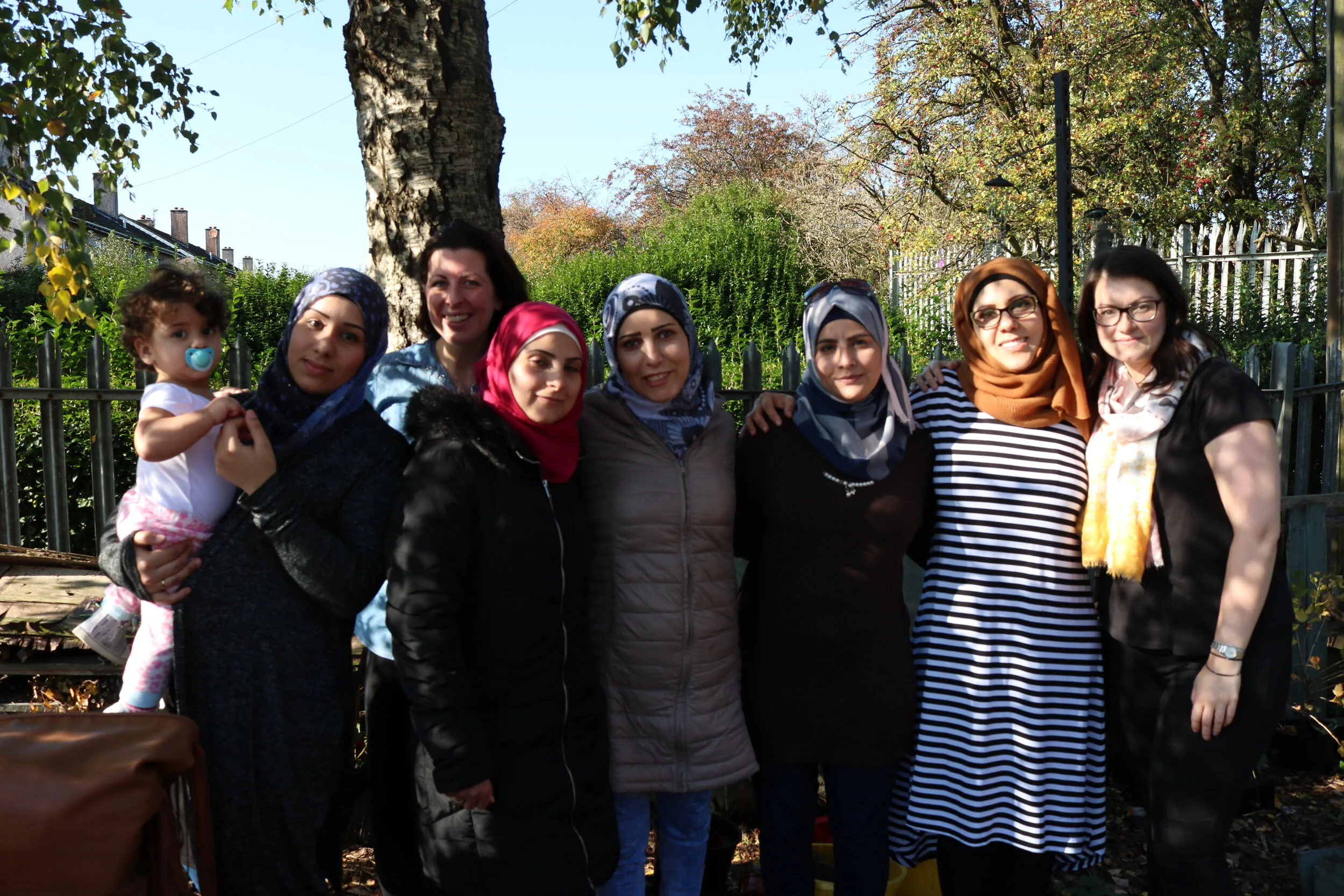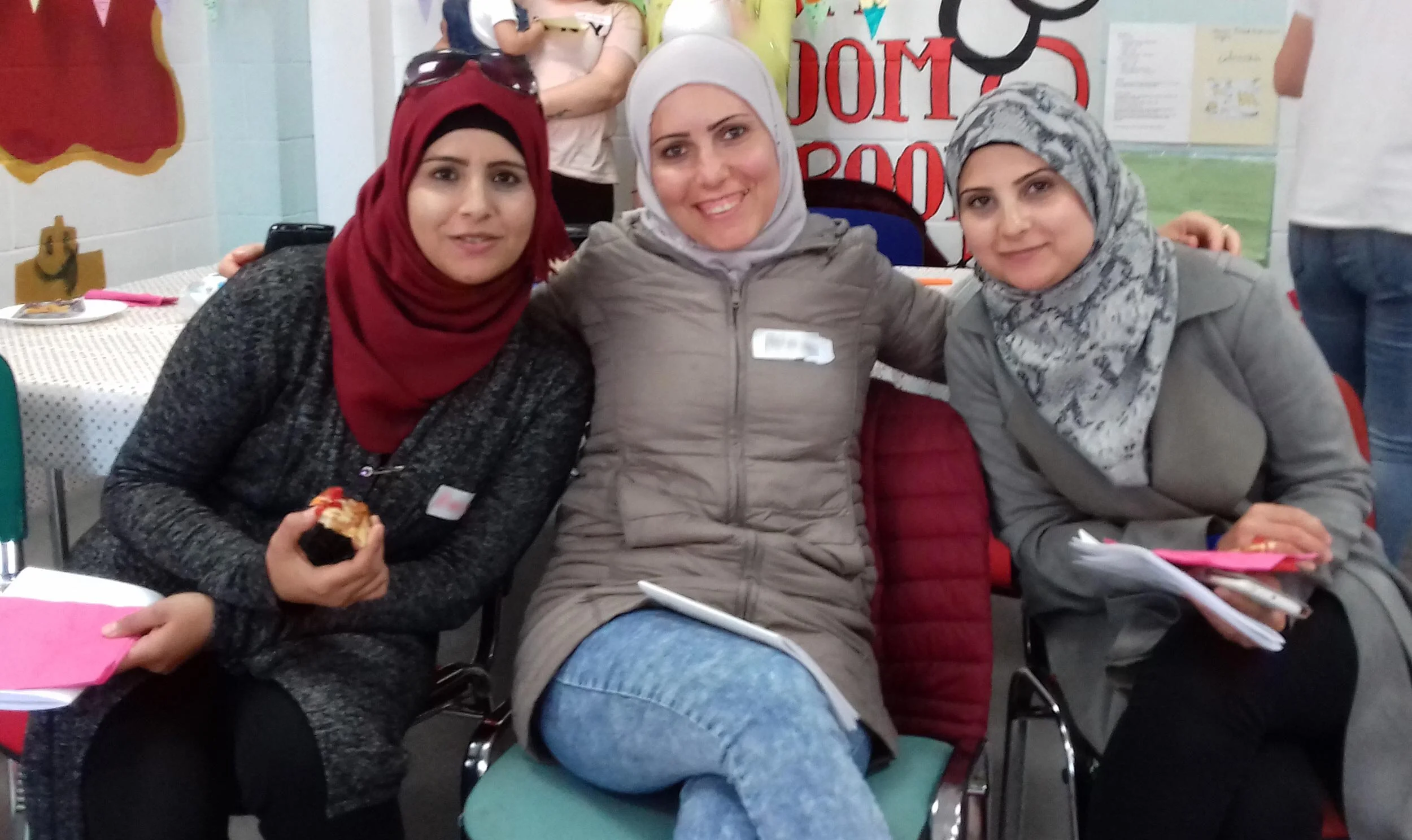Moments of Freedom is a group of Syrian women, driven out of their home by war. They came to Clydebank in Scotland in search of safety and a better future for their children. The group is a place for the women to come together to be themselves, make connections, share their skills and expertise to shape their local community for the meaningful integration of their families. The women have told their own story in words and in photos which can be seen and read here.
As workers we wanted to tell our story too, because we thought it might be useful for others working in communities across Scotland and beyond. It is a story of what we brought to the work, but really it is a story of what the women taught us.
We are Jill and Kate, two Development Workers at Outside the Box, a charity which provides independent development support to groups and people across Scotland who want to make a difference in their communities.
Kate is a community arts worker who has been working in and with communities across Glasgow for almost 15 years, supporting people, including New Scots, to feel like they belong and can contribute to their communities.
Jill’s background includes homeless care experienced young people and gypsy travellers. She has always had a strong interest in how injustice and disempowerment and play out in communities and society.
We both knew that those who hold power dictate how people participate. We both wanted to create spaces for people to have their voices heard and in that way, access their rights.
Moments of Freedom began in 2017 with a conversation in a coffee break between Jill and Valerie, a resettlement worker from the local authority. Valerie began speaking about some New Scots women she knew, who felt isolated. We agreed to meet them and see if there was anything we could do to support them.
We didn’t go in with a plan. The only agenda was to get a sense of where the women were at, and to develop an understanding of each other. We wanted to build a safe space where we could create something together that would feel meaningful to them. There was energy in that first meeting, we were really excited and the women brought a sparkle to the room.
We worked intuitively but we were very aware that we were applying a range of theories to our practice, and have found it useful to reflect on how they supported our work.
Moments of Freedom took us out of our ‘comfort zone’ and very much in the ‘learning zone’ but having two of us holding the space and learning together, knowing that if something traumatic came in we could keep each other and the group safe, meant that we didn’t get into the ‘panic zone’.
It felt very equal because there was a certain amount of vulnerability on our part too. We hadn’t worked together before and we don’t speak Arabic. We brought our whole selves to it, so that the women could see us as human beings not just workers. We thought carefully about the 3 Ps (personal, professional and private) . We knew that we needed to share enough to build authentic relationships, with a clear purpose and boundaries to keep everyone safe. So for instance, we shared that we were both mothers, and at one point, Jill introduced her young daughter to the group. This deepened trust on both sides.
From the outset we based our approach on the Common Third. Just going in to have a chat wasn’t going to build our relationship or establish a shared purpose. We needed practical, purposeful activity to provide a vehicle and a language to help us communicate what mattered. We did gardening, sports, and art together. We didn’t rush these. They enabled us to get to a deeper understanding of who the women were and what they could offer, as well as what they needed, at a pace dictated by them.
In this way we found ourselves practicing Asset Based Community Development (ABCD). The women were using their own skills and gifts to create community, like they would have done in Syria.
We discovered through listening to them that they wanted to make links with the wider community in Clydebank. We considered together the potential inequalities they would face as a group of Muslim women who were new to Scotland. And it was when we took an intersectional approach that the women really began to take ownership of the group. Considering intersectionality encouraged them to consider their identity in different settings and how power imbalances can affect their ability to achieve goals and aspirations. That was a turning point. The women started to say ‘this is our group, this belongs to us’. Valerie attended one meeting and told us that she had never seen the women speak so openly before.
We supported the group to plot where they want to be [both at a community level and in shaping a new project] whilst reflecting on the ‘intersections’ that may impede or encourage their ability to ‘get there’. This helped to reinforce the peer support the group already give to each other as well as opening up opportunities for considering where peer support may exist or could be created within the wider community. The women identified these particular spaces as ‘Moments of Freedom’, places to enjoy new experiences and situations. They wanted to celebrate their identity, gifts and skills with local women and they craved a sense of belonging; they wanted more people to say hello to and wave to.
Once again, we found ourselves applying ABCD. We did some community mapping, both of the visible and invisible aspects of community, drawing it out on flipcharts. They had a fantastic knowledge of their community. They identified that there were very few spaces for women in Clydebank, and very few opportunities for women to come together in safe spaces and meet up for a chat. It was at this point that we saw the women adopting some of our theories in use. They realised that local women were also facing some of the issues they themselves faced around discrimination and fear (intersectionality). They decided to host a community event using the Common Third approach. Local women came and they told stories, shared food and sang songs. People felt the warmth and celebration. They received it as they were sharing something special with us. The women said: That was the first time we felt like we had offered something useful to our community.
Local women asked for more, so they put on monthly gatherings in disused spaces in the community. They made beautiful food. One time no one turned up but they took that failure in their stride, saying it gave them a chance to talk to each other again. That was the day they showed us pictures of themselves with their hijabs off; a sign of their deepening trust.
We have learned so much in Moments of Freedom. We experienced how important it was to go in both open and uncertain, bringing in ourselves rather than our solutions. This enabled the women to trust us, and to take ownership of the group. At the same time we learned how important it was to reflect and learn together as a pair, to keep ourselves and the group contained.
Taking the time to get to know the women and explore their gifts, strengths and skills as a group, often through doing or making something together, providing a good foundation for considering what they wanted to offer the community. Exploring the barriers to participation in their community released their energy and stimulated their curiousity about local women.
We are struck by how simple the work is, and yet we felt often that we were working at the edge of what felt comfortable. In the end it was trust that mattered: trusting ourselves that we could work it through together, and trusting the women that they were in it with us, as equal partners, and together we could make it work.







